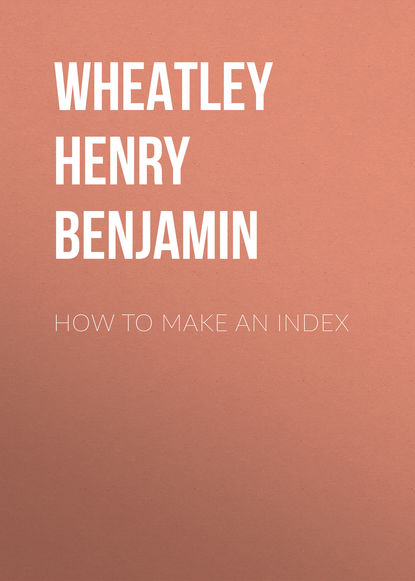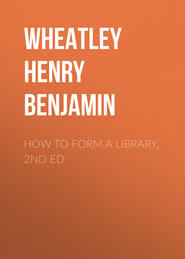По всем вопросам обращайтесь на: info@litportal.ru
(©) 2003-2024.
✖
How to Make an Index
Автор
Год написания книги
2018
Настройки чтения
Размер шрифта
Высота строк
Поля
"Societie of bookes."
Here are some of the cross references:
"Alteration vide Inconstancy."
"Amitie vide Friendship."
"Ant vide Emmets."
"Apprehension vide Imagination."
"Balladmakers vide Rymers."
"Boasting vide Vaunting."
"Chance vide Fortune."
"Common People vide the Vulgar."
"Disparity vide Equality."
"Emperickes vide Physitians."
An instance of how loosely the word "index" has been used will be found in Robert Boyle's Some Considerations touchingthe Usefulnesse of Experimental Natural Philosophy (Oxford, 1663). This book is divided into two parts, and at the end of each part is "The Index." This so-called index is arranged in order of the pages, and is really only a full table of contents.
Indexes did not become at all common till the sixteenth century, and Mr. Cornelius Walford asked in Notes and Queries what was the earliest index. Mr. Edward Solly answered: "Polydore Vergil in Anglicæ Historiæ (1556), has what may fairly be called a good index—thirty-seven pages. This may be taken as a starting-point as to date; and we may ask for earlier examples" (6th S. xi. 155). Another contributor referred to an earlier edition of Polydore Vergil (1546), and still another one cited Lyndewood's Provinciale (1525), which has several indexes.
One old index may be singled out as having caused its author serious misfortune. William Prynne concocted a most wonderful attack upon the "stage" under the title of Histrio-Mastix (1633), which is absolutely unreadable by reason of the vast mass of authorities gathered from every century and every nation, to prove the wickedness of play-acting. Carlyle refers to the Histrio-Mastix as "a book still extant, but never more to be read by mortal."
If Prynne had sent his child out into the world without an index, he might have escaped from persecution, as no one would have found out the enormities which were supposed to lurk within the pages of the book. But he was unwise enough to add a most elaborate index, in which all the attacks upon a calling that received the sanction of the Court were arranged in a convenient form for reference. Attorney-General Noy found that the author himself had forged the weapons which he (the prosecutor) could use in the attack. This is proved by a passage in Noy's speech at Prynne's trial, where he points out that the accused "says Christ was a Puritan, in his Index." Noy calls it an index, but Prynne himself describes it as "A Table (with some brief additions) of the chiefest passages in this treatise."[2 - There is a note to the table which shows that the book grew in size during the printing—"p. signifying the page, f. the folioes from pag. 513 to 545 (which exceeded the Printer's computation), m. the marginall notes: if you finde f. before any pages from 545 to 568, then looke the folioes which are overcast; if p. then the page following."]
The entries in the index are so curious and one-sided in their accusations that it is worth while to quote some of them rather fully:
"Actors of popular or private enterludes for gaine or pleasure, infamous, unlawfull and that as well in Princes, Noblemen, Gentlemen, Schollers, Divines or Common Actors."
"Æschylus, one of the first inventors of Tragedies—his strange and sudden death."
"Christ wept oft, but never laughed—a puritan—dishonoured and offended with Stage playes."
"Crossing of the face when men go to plays shuts in the Devil."
"Devils, inventors and fomentors of stage plays and dancing. Have stage plays in hell every Lord's day night."
"Heaven—no stage plays there."
"Herod Agrippa smitten in theater by an angel and so died."
"Herod the great, the first erecter of a theater among the Jews who thereupon conspire his death."
"King James his statute against prophaning scripture and God's name in Playes—his Statutes make Players rogues and Playes unlawfull pastimes."
"Kings—infamous for them to act or frequent Playes or favour Players."
"Plagues occasioned by stage plays. All the Roman actors consumed by a plague."
"Play-bookes see Bookes."
"Players infamous …
–– many of them Papists and most desperate wicked wretches."
"Play haunters the worst and lewdest persons for the most part...."
"Play haunting unlawfull...."
"Play-houses stiled by the Fathers and others, the Devil's temples, Chappels and synagogues...."
"Play-poets examples of God's judgements on the chiefest of them...."
"Puritans, condemners of Stage-playes and other corruptions stiled so—The very best and holiest Christians called so....—Christ, his prophets, apostles, the Fathers and Primitive christians Puritans as men now judged—hated and condemned onely for their grace yea holinesse of life—Accused of hypocrisie and sedition, and why."
"Puritan, an honourable nickname of Christianity and grace."
"Theaters overturned by tempests."
It was the strong terms in which women actors are denounced that gave such offence at Court, where the Queen and her ladies were specially attracted to the stage. Prynne's book was published six weeks before Henrietta Maria acted in a pastoral at Somerset House, so that the following passage could not have been intended to allude to the Queen:[3 - See Cobbett's State Trials, vol. 3, coll. 561-586.]
"Women actors notorious whores … and dare then any Christian women be so more than whorishly impudent as to act, to speake publikely on a stage perchance in man's apparell and cut haire here proved sinfull and abominable in the presence of sundry men and women?… O let such presidents of impudency, of impiety be never heard of or suffered among Christians."
There are some interesting letters in Ellis's Original Letters (2nd Series, vol. 3) which illustrate the effect on the Court of these violent expressions of opinion. Jo. Pory wrote to Sir Thomas Puckering on September 20th, 1632: "That which the Queen's Majesty, some of her ladies and all her maides of honour are now practicing upon is a Pastorall penned by Mr. Walter Montague, wherein her Majesty is pleased to acte a parte, as well for her recreation as for the exercise of her Englishe."
George Gresley wrote to the same Puckering on the following 31st of January: "Mr. Prinne an Utter Barrister of Lincoln's Inne is brought into the High Commission Court and Star Chamber, for publishing a Booke (a little before the Queene's acting of her play) of the unlawfullness of Plaies wherein in the Table of his Booke and his brief additions thereunto he hath these words [the extracts given above are here printed], which wordes it is thought by some will cost him his eares, or heavily punnisht and deepely fined."
Those who thought thus were amply justified in their opinion. Mr. Hill Burton observes that it was a very odd compliment to Queen Henrietta Maria to presume that these words refer to her, and he adds that the supposition reminds him of Victor Hugo's sarcasm respecting Napoleon III., that when the Parisian police overheard any one use the terms "ruffian" and "scoundrel," they said, "You must be speaking of the Emperor!"
Prynne is so full in his particulars that he might have given us much information respecting the stage in his own day, which we should have welcomed; but, instead, he is ever more ready to draw his examples from Greek and Latin authorities.
In the eighteenth century a practice arose of drawing up indexes of sentiments and opinions as distinguished from facts. Such indexes required a special skill in the indexer, who was usually the original author. There is a curious poetical index to the Iliad in Pope's Homer, referring to all the places in which similes are used.
Samuel Johnson was very anxious that Richardson should produce such an index to his novels. In the Correspondence of Samuel Richardson (vol. v., p. 282) is a letter from Johnson to the novelist, in which he writes: "I wish you would add an index rerum, that when the reader recollects any incident, he may easily find it, which at present he cannot do, unless he knows in which volume it is told; for Clarissa is not a performance to be read with eagerness, and laid aside for ever; but will be occasionally consulted by the busy, the aged and the studious; and therefore I beg that this edition, by which I suppose posterity is to abide, may want nothing that can facilitate its use."
At the end of each volume of Clarissa Harlowe Richardson added a sort of table of all the passages best worth remembering, and as he was the judge himself, it naturally extended to a considerable length. In September, 1753, Johnson again wrote to Richardson suggesting the propriety of making an index to his three works, but he added: "While I am writing an objection arises; such an index to the three would look like the preclusion of a fourth, to which I will never contribute; for if I cannot benefit mankind I hope never to injure them."
Richardson took the hint of his friend, and in 1755 appeared a volume of four hundred and ten pages, entitled, A Collection of the moral and instructive Sentiments, Maxims, Cautions, and Reflexions contained in the Histories of Pamela, Clarissa and Sir Charles Grandison, digested under proper heads.
The tables of sentiments are arranged in separate alphabets for each novel. The production of this book was a labour of love to its author, who, moreover, was skilled in the mechanical work of indexing, and in the early part of his career had filled up his leisure hours by compiling indexes for the booksellers and writing prefaces and dedications. At the end of his "collection" are two letters from the author to two of his admirers; one was to a lady who was solicitous for an additional volume to Sir Charles Grandison, supposing that work ended too abruptly.
David Hume is to be added to the list of celebrated men who have been indexers, although he does not appear to have liked the work. In referring to the fourth edition of his Essays he wrote: "I intend to make an index to it." Two years later he is grateful that the work of indexing another book is to be done for him; writing to Millar (December 18th, 1759), he says: "I think that an Index will be very proper, and am glad that you free me from the trouble of undertaking that task, for which I know myself to be very unfit."[4 - Letters of David Hume to William Strahan, edited by G. Birkbeck Hill, D.C.L. Oxford, 1888.]









